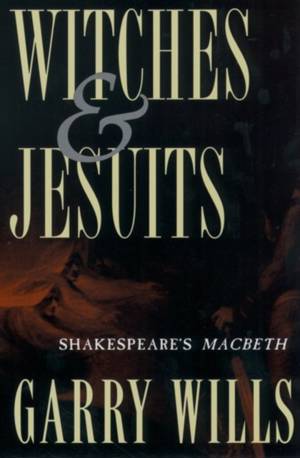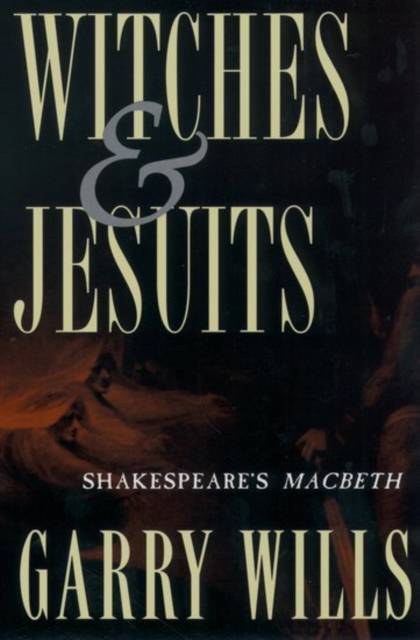
En raison d'une grêve chez bpost, votre commande pourrait être retardée. Vous avez besoin d’un livre rapidement ? Nos magasins vous accueillent à bras ouverts !
- Retrait gratuit dans votre magasin Club
- 7.000.000 titres dans notre catalogue
- Payer en toute sécurité
- Toujours un magasin près de chez vous
En raison de la grêve chez bpost, votre commande pourrait être retardée. Vous avez besoin d’un livre rapidement ? Nos magasins vous accueillent à bras ouverts !
- Retrait gratuit dans votre magasin Club
- 7.000.0000 titres dans notre catalogue
- Payer en toute sécurité
- Toujours un magasin près de chez vous
Description
In his Pulitzer Prize-winning 1993 book Lincoln at Gettysburg, Garry Wills showed how the Gettysburg Address revolutionized the conception of modern America. In Witches and Jesuits, based on his Oxford/New York Public Library lectures, Wills again focuses on a single document to open up a window on an entire society. He begins with a simple question: If Macbeth is such a great tragedy, why do performances of it so often fail? The stage history of Macbeth is so riddled with disasters that it has created a legendary curse on the drama. Superstitious actors try to evade the curse by referring to Macbeth only as "the Scottish play," but production after production continues to soar in its opening scenes, only to sputter towards anticlimax in the later acts. By critical consensus there seems to have been only one entirely successful modern performance of the play, Laurence Olivier's in 1955.
Drawing on his intimate knowledge of the vivid intrigue and drama of Jacobean England, Wills restores Macbeth's suspenseful tension by returning it to the context of its own time, recreating the burning theological and political crises of Shakespeare's era. He reveals how deeply Macbeth's original 1606 audiences would have been affected by the notorious Gunpowder Plot of 1605, when a small cell of Jesuits came within a hairbreadth of successfully blowing up not only the King, but the Prince his heir, and all members of the court and Parliament. Wills likens their shock to that endured by Americans following Pearl Harbor or the Kennedy assassination. Furthermore, Wills documents, the Jesuits were widely believed to be acting in conjunction with the Devil. We see that the treason and necromancy in Macbeth were more than the imaginings of a gifted playwright--they were dramatizations of very real and potent threats to the realm.
In this new light, Macbeth is transformed. Wills presents a drama that is more than a well-scripted story of a murderer getting his just penalty, it is the struggle for the soul of a nation. The death of a King becomes a truly apocalyptic event, and the witches on the heath, shrugged off as mere symbols of Macbeth's inner guilt and ambition by twentieth century interpreters, emerge as independent agents of the occult with their terrifying agendas. Restoring the theological politics and supernatural elements that modern directors have shied away from, Wills points the way toward a Macbeth that will finally escape the theatrical curse on "the Scottish play."
Rich in insight and a joy to read, Witches and Jesuits is a tour de force of scholarship and imagination by one of our foremost writers. It is essential reading for anyone who loves the language.
Drawing on his intimate knowledge of the vivid intrigue and drama of Jacobean England, Wills restores Macbeth's suspenseful tension by returning it to the context of its own time, recreating the burning theological and political crises of Shakespeare's era. He reveals how deeply Macbeth's original 1606 audiences would have been affected by the notorious Gunpowder Plot of 1605, when a small cell of Jesuits came within a hairbreadth of successfully blowing up not only the King, but the Prince his heir, and all members of the court and Parliament. Wills likens their shock to that endured by Americans following Pearl Harbor or the Kennedy assassination. Furthermore, Wills documents, the Jesuits were widely believed to be acting in conjunction with the Devil. We see that the treason and necromancy in Macbeth were more than the imaginings of a gifted playwright--they were dramatizations of very real and potent threats to the realm.
In this new light, Macbeth is transformed. Wills presents a drama that is more than a well-scripted story of a murderer getting his just penalty, it is the struggle for the soul of a nation. The death of a King becomes a truly apocalyptic event, and the witches on the heath, shrugged off as mere symbols of Macbeth's inner guilt and ambition by twentieth century interpreters, emerge as independent agents of the occult with their terrifying agendas. Restoring the theological politics and supernatural elements that modern directors have shied away from, Wills points the way toward a Macbeth that will finally escape the theatrical curse on "the Scottish play."
Rich in insight and a joy to read, Witches and Jesuits is a tour de force of scholarship and imagination by one of our foremost writers. It is essential reading for anyone who loves the language.
Spécifications
Parties prenantes
- Auteur(s) :
- Editeur:
Contenu
- Nombre de pages :
- 240
- Langue:
- Anglais
Caractéristiques
- EAN:
- 9780195102901
- Date de parution :
- 25-01-96
- Format:
- Livre broché
- Format numérique:
- Trade paperback (VS)
- Dimensions :
- 130 mm x 203 mm
- Poids :
- 267 g

Les avis
Nous publions uniquement les avis qui respectent les conditions requises. Consultez nos conditions pour les avis.






